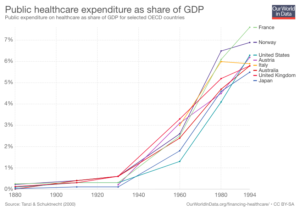Business & Money
Reading through the new tax legislation is woefully boring, so I think I’ll give it a rest pretty soon. But before I do, I’ll just say this. The new tax law was sold to the American people as a job creator and a boon for US investment. I’m not so sure.
On the jobs front, unemployment is near record lows hovering around 4.1%. For the uninitiated, that means we’re closing in on what’s termed “full employment.” So even if US firms invest heavily and create a ton of jobs, where will the new workers come from? And if there aren’t many workers to fill the new jobs, will companies really expand US operations and build new factories?
And now we have all of these companies giving out raises and bonuses after the bill was passed. But I’m not sure I buy the idea that companies are just giving away money out of kindness and generosity. Feels more like well tuned and well-timed work from PR executives.
And besides, how much money are we even talking about? Maybe a couple percentage points of profitability? It seems to me that these bonuses could have been handed out a long time ago without much trouble. But better late than never, I guess.
So PR coverage, rainbows, and butterflies aside, corporations operate to maximize profits. And their motivations won’t be changing anytime soon.
And oh yea, all of these cry babies complaining about our massive deficit, what do tax cuts mean? An even higher deficit.
Human Progress
Earlier this month, the Amazon Go concept store opened in Seattle. It is the quintessential image of technology and innovation. It is sensors, and IOT, and computer vision, and mobile payments, and cloud computing, and who knows what else.
But then you have the detractors. “What about all those cashiers,” they ask. The Bureau of Labor Statistics puts cashiers in the US around 3.4 million. And another 4.6 million working in retail sales more broadly. Safe to say many of those will disappear.
And as much as that sucks, it is simply the way that human progress works.
Karl Marx would probably be rolling in his grave if he knew about Amazon Go. He’d claim this was another case of labor being subjugated by capital. He’d encourage the cashiers and retail workers to revolt and overthrow the tech bourgeoisie. But like the Luddites and factory workers of the industrial revolution, they don’t stand a chance.
But it’s not all bad news. Despite government shutdowns and “my button is bigger than your button” commentary, we can still have hope. In fact, I’d say that 2017 was the best year in human history.
“A smaller share of the world’s people were hungry, impoverished or illiterate than at any time before. A smaller proportion of children died than ever before. The proportion disfigured by leprosy, blinded by diseases like trachoma or suffering from other ailments also fell…. Every day, the number of people around the world living in extreme poverty (less than about $2 a day) goes down by 217,000… Every day, 325,000 more people gain access to electricity. And 300,000 more gain access to clean drinking water.”
Go humanity, go!
Philosophy
There’s this Hispanic man that comes to my office every afternoon to clean. Every day, he waltzes in with a bubbly demeanor and a big smile on his face. If I happen to walk by him in the kitchen or the bathroom, he always makes genuine eye contact followed by a “what’s up buddy, how are you?” And it’s not one of those “just saying hi because you happen to be two feet away from me” greetings. He stands there and waits for a reply. I think he actually wants to know how I’m doing.
I point this out because he doesn’t have to be that away. I won’t guess at his hourly rate, but I imagine it’s not very much. And I also imagine that my office isn’t the only one he cleans on a given day. He probably bounces from office to office mopping floors, cleaning toilets, and emptying trash cans.
Meanwhile, when I think about walking to the office from the subway in the morning, you see so many people with angry and disgruntled looks on there faces. They don’t say excuse me, they bump into you without as much as a glance, and they definitely do everything they can to avoid eye contact. And most of them are not on their way to clean toilets. They are founders of companies, lawyers, investors, VPs of something or another, or otherwise successful people.
I point this dichotomy our for two reasons.
First, human beings have this uncanny ability to magnify the scope of their own problems, while basically ignoring those of others. And that is irrespective of your station in life. The problems might be vastly different, but the emotional and psychological pain caused by them is the same.
Second, and I believe more importantly, it is completely up to you how you choose to respond to a given situation. You often don’t have control over what happens, but you DO have control over your response. You can smile and whistle while cleaning toilets, and you can be completely miserable and empty inside while wearing a $5,000 suit and drinking a $5 cup of coffee. It’s simply up to you.
My Latest Discovery
If you clicked on the link in the Human Progress section, you may have noticed that the article linked to another site called Our World in Data. It’s absolutely fascinating. You can basically find any subject you’re interested in, and the site offers up tons of statistics and data visualizations about that subject.
If you read VIC 102, I wrote about rising costs in healthcare. This chart, and the associated research, captures that pretty clearly:
